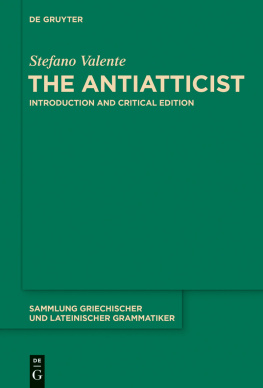Singleton - Language and the lexicon: an introduction
Here you can read online Singleton - Language and the lexicon: an introduction full text of the book (entire story) in english for free. Download pdf and epub, get meaning, cover and reviews about this ebook. City: London, year: 2016, publisher: Routledge, genre: Children. Description of the work, (preface) as well as reviews are available. Best literature library LitArk.com created for fans of good reading and offers a wide selection of genres:
Romance novel
Science fiction
Adventure
Detective
Science
History
Home and family
Prose
Art
Politics
Computer
Non-fiction
Religion
Business
Children
Humor
Choose a favorite category and find really read worthwhile books. Enjoy immersion in the world of imagination, feel the emotions of the characters or learn something new for yourself, make an fascinating discovery.
- Book:Language and the lexicon: an introduction
- Author:
- Publisher:Routledge
- Genre:
- Year:2016
- City:London
- Rating:3 / 5
- Favourites:Add to favourites
- Your mark:
- 60
- 1
- 2
- 3
- 4
- 5
Language and the lexicon: an introduction: summary, description and annotation
We offer to read an annotation, description, summary or preface (depends on what the author of the book "Language and the lexicon: an introduction" wrote himself). If you haven't found the necessary information about the book — write in the comments, we will try to find it.
Language and the lexicon: an introduction — read online for free the complete book (whole text) full work
Below is the text of the book, divided by pages. System saving the place of the last page read, allows you to conveniently read the book "Language and the lexicon: an introduction" online for free, without having to search again every time where you left off. Put a bookmark, and you can go to the page where you finished reading at any time.
Font size:
Interval:
Bookmark:

Language and the Lexicon
LANGUAGE AND THE LEXICON
An Introduction
DAVID SINGLETON
Associate Professor of Applied Linguistics Trinity College Dublin

First published 2000 by Hodder Education
Co-published in the United States of America by
Oxford University Press Inc.,
198 Madison Avenue, New York, NY10016
Published 2016 by Routledge
2 Park Square, Milton Park, Abingdon, Oxon OX14 4RN
711 Third Avenue, New York, NY 10017, USA
Routledge is an imprint of the Taylor & Francis Group, an informa business
2000 David Singleton
All rights reserved. No part of this book may be reprinted or reproduced or utilised in any form or by any electronic, mechanical, or other means, now known or hereafter invented, including photocopying and recording, or in any information storage or retrieval system, without permission in writing from the publishers.
The advice and information in this book are believed to be true and accurate at the date of going to press, but neither the authors nor the publisher can accept any legal responsibility or liability for any errors or omissions.
Every effort has been made to trace and acknowledge the owners of copyright. The publishers will be glad to make suitable arrangements with any copyright holders whom it has not been possible to contact.
British Library Cataloguing in Publication Data
A catalogue record for this book is available from the British Library
Library of Congress Cataloging-in-Publication Data
A catalog record for this book is available from the Library of Congress
ISBN 13: 978-0-340-73174-1 (pbk)
Cover Design: Terry Griffiths
Typeset in 10/12 Sabon by Saxon Graphics Ltd, Derby
In memoriam
This book is dedicated to the memory of my much-missed friend Andrew Corrigan, unvanquished jazzman, wordsmith extraordinaire and irreplaceable companion.
Too irreverent for the clergy,
Too irrelevant for the sages,
I tinker on,
Lost in a maze of words
That hide their meanings
In a jovial host
Of irreverence
And irrelevance.
Andrew Corrigan, Disbelief Between, October 1973
Contents
A number of people have made valuable contributions to the process of which this book is the product. I especially need to acknowledge the absolutely indispensable assistance I received in the initial stages of planning and writing the volume from Lisa Ryan, now Research Fellow in Linguistics at University College, Dublin. Without Lisas input, some of the early chapters might never have reached any kind of conclusion, never mind a happy one. I am also indebted to Jennifer Pariseau for using some of the time she spent teaching in Thailand in 1998-99 to collect examples in Thai, which she was then good enough to pass on to me for recycling in the pages that follow.
Various other colleagues have shown their usual generosity in agreeing to cast a critical eye over parts of the book relating to areas where their expertise easily outstrips mine. In this connection I should like to thank Nicola McLelland of the Department of Germanic Studies, Trinity College Dublin, Breffni ORourke of the Centre for Language and Communication Studies, Trinity College Dublin, Vera Regan of the Department of French, University College Dublin, and Carl Vogel of the Department of Computer Science, Trinity College, Dublin. A further very helpful sounding board was provided by the editorial team at Edward Arnold, and in particular by Christina Wipf Perry, to whom I am most grateful indeed not only for the unflagging encouragement she offered but also for her great sensitivity and aplomb in guiding me away from all manner of blind alleys.
At an institutional level my thanks are due to the Trinity College Dublin Arts/ESS Benefactions Fund for financial support of my research in the lexical area and to the Board of Trinity College Dublin for granting me a six-month leave of absence while I was preparing this book.
Finally, I should like most warmly to thank my wife, Emer, and my sons, Christopher and Daniel, for various kinds of help they have given me over the past two years and perhaps above all for their forbearance!
I am all too aware that, despite all the advice and assistance I have received from the above, the volume is very far from perfect and contains many faults and failings, for which I am entirely unabashed to recognize my sole responsibility. After all, in the words of the Chevalier de Boufflers, perfectibility is to perfection what time is to eternity.
Greystones, County Wicklow
February 2000
This book is about the lexicon. Lexicon is the Anglicized version of a Greek word (), which basically means dictionary, and it is the term used by linguists to refer to those aspects of a language which relate to words, otherwise known as its lexical aspects. Lexicon is based on the term lexis (), whose Greek meaning is word, but which is used as a collective expression in linguistic terminology in the sense of vocabulary. The study of lexis and the lexicon is called lexicology.
In fact, as we shall see in the course of the next 200 pages or so, almost everything in language is related in some way or other to words. We shall also see that, conversely, the lexical dimension of language needs to be conceived of as rather more than just a list of lexical items.
In the beginning was the Word
This opening pronouncement of the Gospel of John in the New Testament may or may not be a true claim about the origins of the cosmos. However, if taken as a statement about where our thinking about language started from (and continues to start from) it is hard to fault.
The original version of Johns Gospel was written in Greek, and in this version the term used for word is lgos (), which, significantly enough, meant (and in Modern Greek still means) speech as well as word. This kind of association between the concept of word and a more general concept of speech or language is by no means confined to Greek culture. For example, to stay with the Gospel of John for just a little longer, the Latin translation of the above quotation is : In principio erat Verbum , where is replaced by verbum, an expression which, like the Greek term, was applicable to speech as well as to individual words. Thus, for example, one way of saying to speak in public in Latin was verbum in publico facere (literally, word in public to make).
A similar association between word and speech is to be found in many other languages. For example, this dual meaning attaches to French parole, Italian parola and Spanish palabra. Similarly, in Japanese the term kotoba (word, phrase, expression) is often abbreviated to koto or goto and is used as a suffix in expressions referring to speech such as hitorigoto o iu (literally, by-oneself-word say = talk to oneself) and negoto o iu (literally, sleep-word say = talk in ones sleep); in Swedish the expression en ordets man (literally, an of-the-word man) is used to refer to a skilled speaker; and in German one way of saying to refuse someone permission to speak translates literally as from someone the word to remove einem das Wort entziehen. In English, too, the association between the word and language in use is very much a feature of the way in which linguistic events are talked about in ordinary parlance, as the following examples illustrate:
Next pageFont size:
Interval:
Bookmark:
Similar books «Language and the lexicon: an introduction»
Look at similar books to Language and the lexicon: an introduction. We have selected literature similar in name and meaning in the hope of providing readers with more options to find new, interesting, not yet read works.
Discussion, reviews of the book Language and the lexicon: an introduction and just readers' own opinions. Leave your comments, write what you think about the work, its meaning or the main characters. Specify what exactly you liked and what you didn't like, and why you think so.







